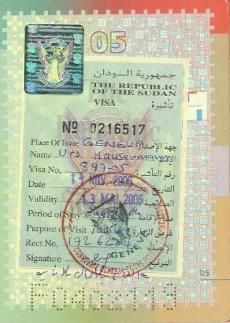The UN should be reformed to make intervention in failing states easier, a commission is set to recommend.
The panel, which has examined how the UN could respond better to global threats, also calls for the Security Council to be enlarged, the BBC has learned.
The report has been called the "biggest make-over" of the UN since 1945.
It is thought that if the UN shows greater readiness to act, unilateralism by member states would be less likely.
A year ago, in the wake of the international divisions over Iraq, UN Secretary General Kofi Annan warned the UN was at a "fork in the road".
He said the organisation had to review its fundamental policies in order to address the increasing threats of global terrorism, weapons of mass destruction and nuclear proliferation.
He asked a panel of 16 veteran diplomats and politicians, chaired by former Thai Prime Minister Anand Panyarachun, to examine ways the UN should be reformed.
The route the panel is set to advocate is much more interventionist, moving away from the UN's traditional emphasis that it cannot meddle in the internal affairs of a member state.
Pre-emptive
The BBC has been told that among the panel's main findings are calls for a peace-building commission to be established to monitor potential trouble spots, offer help and advice, give warnings and prepare the way for armed intervention as a last resort.
The panel wants member states to accept a new obligation - a "responsibility to protect" their own citizens.
If they failed to do so, then intervention by the Security Council would be much more likely than under current UN procedures.
At the moment, the Council can order intervention, and a member state can act in self-defence, if there is an imminent threat. The Council can declare a threat to international security but the definition is vague and the procedure unwieldy.
This report recommends that the Council should be more willing to act pre-emptively, though according to five strict criteria:
* the threat should be defined
* the purpose of intervention should be clear
* it should be a last resort,
* the means should be proportionate
* the consequences should be examined
Whether the Council would in fact take action would depend on what the crisis was and how it voted. The UN would not have its own peace-keeping force, although several members of the panel wanted this.
Broad definition
Among the other main findings, the panel suggests threats to international security should be defined widely and should include poverty, pandemics like Aids and environmental disasters, not just threats from weapons of mass destruction, wars and failed states.
Panel's members
Anand Panyarachun (Chairman), former Prime Minister of Thailand
Robert Badinter (France)
Joao Clemente Baena Soares (Brazil)
Gro Harlem Brundtland (Norway)
Mary Chinery-Hesse (Ghana)
Gareth Evans (Australia)
Lord David Hannay (United Kingdom)
Enrique Iglesias (Uruguay)
Amre Moussa (Egypt)
Satish Nambiar (India)
Sadako Ogata (Japan)
Yevgenii Primakov (Russia)
Qian Qichen (China)
Nafis Sadik (Pakistan)
Salim Ahmed Salim (Tanzania)
Brent Scowcroft (United States)
The Security Council should be enlarged from 15 members to 24 - the five permanent members, the US, Russia, China, the UK and France, should keep their seats and their vetoes (any changes to that would simply not be agreed, it was felt).
The panel does not, however, recommend how this should be achieved and simply offers two models. In the first, there would be more permanent members without a veto. In the second there would be some semi-permanent members who must be voted onto the Council every four years.
Terrorism would be defined for the first time and should be made part of an international convention. Terrorism would mean any action targeted against non-combatants and civilians.
To help stop the spread of nuclear weapons, countries wanting fuel for their nuclear power should have automatic rights to get supplies under the International Atomic Energy Agency so long as they complied with inspection regimes.
These inspections should themselves be drastically tightened up. The system would work rather as the International Monetary Fund does where members have drawing rights on currencies.
Regional organisation like the African Union should be strengthened. Any peacekeeping operation should be funded by the UN itself and member states should pay automatically.
The G8 group of countries should be expanded and changed. One idea put forward is that membership of the G8, which is made up only of the rich, should be widened to 20 bringing in developing countries.
The UN Human Rights Commission should be re-invigorated with more human rights activists and fewer diplomats on members' delegations.
The report will now be considered by the Secretary General and then by the member states.
Any institutional changes are likely to come only slowly but the thrust is clear - the UN must reform or lose its role. |
 A Darfur rebel faction is reconsidering its rejection of a peace deal signed by the Sudanese government and the main rebel group this month.
A Darfur rebel faction is reconsidering its rejection of a peace deal signed by the Sudanese government and the main rebel group this month. 
 Sudan refused to grant visas for a U.N. military assessment mission planning a U.N. peacekeeping operation in Darfur, a U.N. spokesman said on Wednesday. The Khartoum government has not consented to U.N. troops to augment the African Union soldiers currently trying to stop the killing and rape in Sudan's Darfur region. But officials said they would discuss it after a peace pact, under negotiation in Abuja, Nigeria.
Sudan refused to grant visas for a U.N. military assessment mission planning a U.N. peacekeeping operation in Darfur, a U.N. spokesman said on Wednesday. The Khartoum government has not consented to U.N. troops to augment the African Union soldiers currently trying to stop the killing and rape in Sudan's Darfur region. But officials said they would discuss it after a peace pact, under negotiation in Abuja, Nigeria.